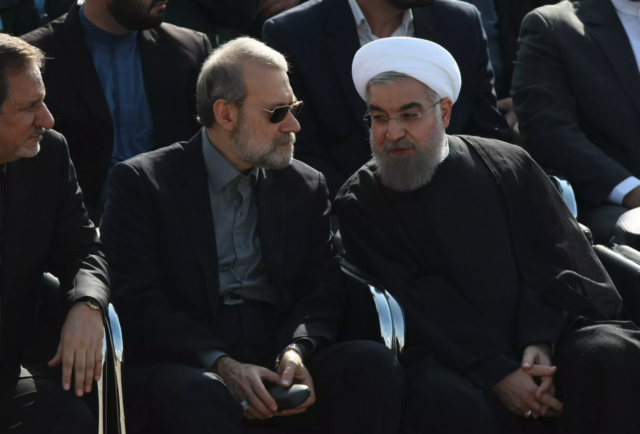The Islamic Republic of Iran cheats. If this is news to you, stop reading here.
If you believe Iran when it says that if the U.S. reverses President Donald Trump’s decision not to renew sanctions waivers permitting outside assistance to Iran’s nuclear facilities, it will meet its obligations under the 2015 Joint Comprehensive Plan of Action (“JCPOA,” or “Iran deal”), stop here.
If you think it is better to keep outsiders in Iran, under the JCPOA, to “reduce Iran’s incentive to enrich uranium at higher levels,” as non-proliferation specialists told The Washington Post—in other words, to keep Iran from cheating more than it otherwise would cheat—stop here.
But, if you understand that the Islamic Republic cheats on everything—on U.N.-imposed nuclear restrictions, including by building a nuclear weapons plant in Syria, on U.N.-imposed conventional arms restrictions, including by transfers to Hezbollah, on the U.N. embargo on ballistic missile development, including by building missile factories in Syria and Lebanon and providing precision missiles to Hezbollah and the Houthis in Yemen, on its human rights obligations, on the oil embargo, and by breaking U.N. embargoes on North Korea and Venezuela—keep going. And if you know that Iran was responsible for the ethnic cleansing of hundreds of thousands of Sunni Syrians from the center of the country into Turkey, and further westward to Europe as refugees, keep going. And if you are sure that Iran is calling for genocide against Israel…well, you get the point.
The point is that President Trump’s decision not to renew a set of sanction waivers is part of a larger policy. First is the administration’s understanding that Iran is not an acceptable negotiating partner, and that its aims—in the Middle East, in the Persian Gulf, in Africa and so forth—are not consistent with peaceful relations and trade. In addition, the president has consistently acted on the principle that if a treaty or agreement is not working, or if parties are cheating, the United States will take steps to leave; consider the Paris Climate Pact, the INF Treaty, Open Skies, the Oslo Accords and the JCPOA.
In 2002, Iran’s previously undisclosed facilities at Natanz and at Arak were uncovered. In 2006, the U.N. Security Council imposed sanctions on Tehran for refusing to suspend enrichment and other sensitive nuclear work. That should have been the end of the problem, right? But documents uncovered by Israel in 2018 showed that Iran was still working on its nuclear weapons program as late as 2009. Thus, approaching the JCPOA, Iran provided the “P5+1” nations and the International Atomic Energy Agency (IAEA) with a faulty baseline for its nuclear activities. Following the deal, the regime failed to permit required inspections at nuclear facilities and failed to make the changes necessary in the Fordow plant to bring it in line with IAEA specifications. And IAEA admits it.
The Foundation for Defense of Democracies wrote last October: “Four years later, Tehran has still not converted [Fordow] into a ‘nuclear, physics and technology centre’ for relevant international scientific cooperation, as it pledged. Moreover, Tehran has slow-rolled any genuine reorientation effort…according to reporting by the IAEA.”
An effective nuclear weapon needs an effective delivery system. And in December 2019, France, Britain and Germany appealed to the U.N., declaring that “Iran’s developments of nuclear-capable ballistic missiles and related technologies is inconsistent” with the JCPOA.
In 2020, 18 years after the discovery of its illicit nuclear activity, Iran’s atomic energy chief, Ali Akbar Salehi, is overtly threatening to restart uranium enrichment at Fordow at 20 percent, well above the 3.67 percent permitted and on the way to weapons-grade. Salehi also announced that the JCPOA-required optic of pouring cement down the core of the Arak reactor to disable it was only for show. “When they told us to pour cement into the tubes…we said: ‘Fine. We will pour.’ But we did not tell them that we had other tubes. Otherwise, they would have told us to pour cement into those tubes, as well.”
There is something to be said for holding Iran even to the less-than-optimal standard of the JCPOA. Those committed to the restoration of sanctions waivers believe that if President Trump ends the waivers and removes the Chinese, Russian and European inspectors and engineers, Iran will do more things—worse things. But Iran is already doing more things and worse things, and sees the U.N., the P5+1 and the IAEA as increasingly toothless.
Iran is correct.
Only the United States can put an end to the incremental and potentially devastating increases in Iranian nuclear and ballistic missile capabilities. Unilaterally ending the sanctions waivers is another step in the process. Next up: extending the JCPOA weapons embargo on Iran set to expire in October.


